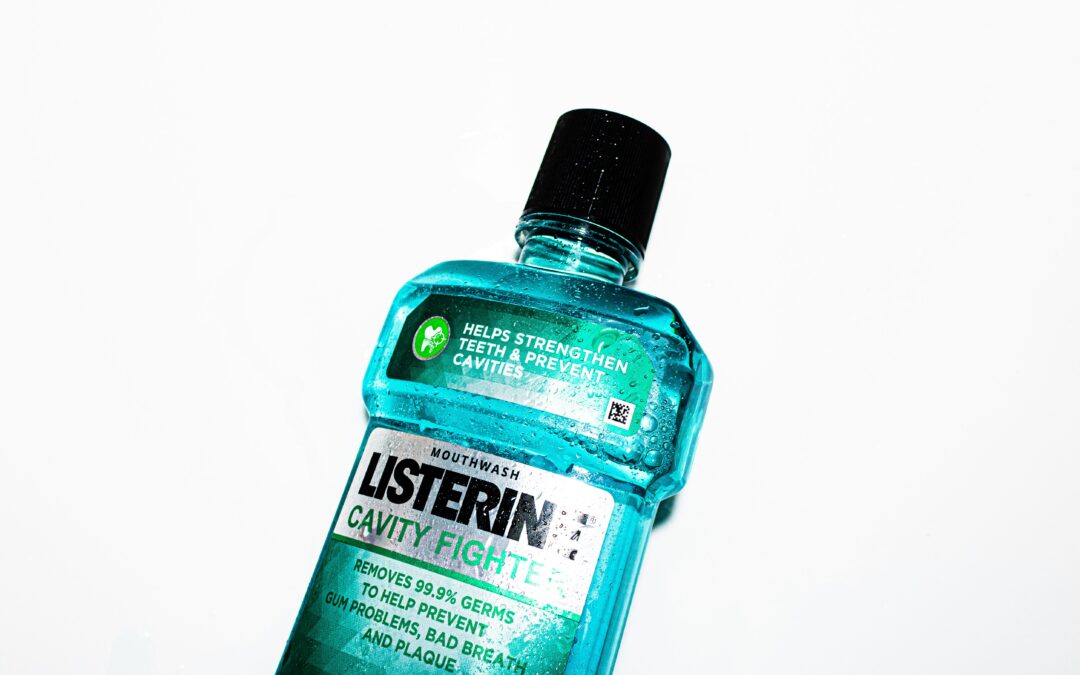Many people use alcohol-based mouthwashes like Listerine mouthwash, thinking it’s a great way to keep their mouths fresh and healthy. While Listerine can help fight bad breath and bacteria, there are some important things to know about it that might make you reconsider whether you want to use it.
Alcohol Content
A lot of Listerine mouthwashes contain alcohol, which can dry out your mouth (2,5). Keep in mind some medications dry out your mouth, compounding the problem. This has potential to be a disastrous dilemma. Saliva is important because it helps wash away food and neutralize acids that can harm your teeth. If your mouth gets too dry, you might end up with more cavities and worse breath instead of better (2).
Oral Irritation
The strong ingredients in Listerine can irritate some people’s mouths, especially if you have sensitive gums or sores. You might feel a burning or stinging sensation, which can make using it uncomfortable and might discourage you from using mouthwash at all. Kids tend to refuse strong alcohol based spicy flavors for this reason. The drying effect and irritation from alcohol-based mouthwashes can lead to the formation of mouth ulcers (2), worsen tooth and gum sensitivity (4,5), and increase the risk of cavities as it reduces the natural protective mechanisms of the mouth.
Potential Cancer Risks
Some studies suggest that using alcohol-based mouthwashes for a long time might increase the risk of oral cancer, especially when combined with other factors like excessive drinking and smoking (1, 4, 5) Because the oral microbiome can be altered significantly, the rise in harmful bacteria associated with gum disease and certain cancers including esophageal and colorectal cancer can dominate. Alcohol creates an acidic environment that may facilitate tumor development.
Other Adverse Effects
Staining of Teeth: Certain ingredients in mouthwash, such as chlorhexidine and artificial dyes, can cause staining of teeth over time[4][5].
Degradation of Dental Restorations: Alcohol can weaken dental adhesives, leading to the premature degradation of restorations such as crowns and veneers.
Enamel Erosion: The high acidity of alcohol can erode tooth enamel over time. This erosion weakens the teeth, making them more susceptible to decay and eventual tooth loss
Main Points
To mitigate these risks, it is recommended to consider using alcohol-free or natural alternatives to maintain oral health without the adverse effects associated with traditional alcohol-based mouthwashes. I personally make my own mouthwash using essential oils and remineralizing compounds that leave me worry free and tastes fantastic.
While alcohol in mouthwashes has shown some benefits of killing bacteria and reducing plaque, long term use should be evaluated and possibly cycled off. So maybe a bottle on, a month off or any way you want to cycle it.
Subscribe in the blue box below for the best DIY mouthwash recipe!
Here is a list of my top 5 brands of safe mouthwashes.
Citations:
[1] https://www.medicalnewstoday.com/articles/alcohol-based-mouthwash-may-disrupt-oral-microbiome-leading-to-gum-disease-and-certain-cancers
[2] https://askthedentist.com/mouthwash-risks-and-alternatives/
[3] https://www.blodgettdentalcare.com/mouthwash-is-bad-for-you-4-better-alternatives/
[4] https://www.geisinger.org/health-and-wellness/wellness-articles/2018/01/29/20/46/is-mouthwash-safe-to-use-every-day
[5] https://www.healthline.com/health/dental-and-oral-health/is-mouthwash-bad-for-you

